2016 年浙江宁波大学基础英语考研真题
I. Vocabulary (20 points)
Directions: There are two sections in this item, which test your use of vocabulary.
Remember to write your answers on the Answer Sheet.
Section A. Multiple choices. Choose an answer from A, B, C and D that best explains
theunderlined word or phrase in each of the following sentences (0.5×20 points).
1. Little donkeys with harmonious tinkling bells thread their way among the throngs
of people.
A. push B. zigzag C. kill D. work
2. “See? This is where it is.” He sketched a little map for me on the back of my
invitation.
A. pointed out B. roughed out C. stretched out D. fetched out
3. The earthen floor, beaten hard by countless feet, deadens the sound of footsteps.
A. kills B. murders C. muffles D. deafens
4. She has told me once that she thinks orchids are tacky flowers.
A. greatly beautiful B. greatly tactful
C. conventionally beautiful D. conventionally tactful
5. After a hearty breakfast, my companions and I traveled by snowmobiles a few miles
farther north to a rendezvous point where the ice was thinner and a nuclear submarine
hovered in the water below.
A. substantial B. heart-stirring C. cordial D. heartfelt
6. “One thing I’d like to know. I got a curious nature, ma’am. How’d you figure
where he was?”
A. number B. draw C. guess D. symbolize
7. In Hemingway’s The Old Man and the Sea, Santiago was a fisherman by trade.
A. commerce B. exchange C. barter D. profession
8. Digitalization is a mathematical scheme that translates data into the simplest
form.
A. changes B. makes C. treats D. deals
9. Now that our relationship to the earth has changed so utterly, we have to see
that change and understand its implications.
A. significances B. consequences C. implied meanings D. sequences
10. I was offered my teaching job back but I declined.
A. inclined B. reclined C. refused D. incurred
11. Some industry observers predict the development of two parallel home markets.
A. homely B. native C. local D. domestic
12. Piquette must have been seventeen then, although she looked about twenty. I
stared at her, astounded that anyone could have changed so much.
A. overwhelmed B. greatly surprised C. worried D. frightened
13. Hitler’s blood lust and the hateful appetites have impelled him on his Russian
adventure.
A. ambition B. stomach C. belly D. intestines
14. Burne-Wilke’s cabin had the dark, warm, comfortable look of a library den. “I
�
say, Henry, what is your position on shipboard drinking? I have a fair bottle of
cherry here.”
A. much-contented B. just C. nice D. beautiful
15. No one would anticipate that my case would snowball into one of the most famous
trials in history.
A. evolve B. run C. develop D. roll
16. Mr. President, I second the proposal! (A silence; Hancock swats a fly.)
A. succeed B. propose C. support D. stand
17. The house detective’s gaze moved on to sweep the spacious, well-appointed room.
A. clean B. mop C. clear D. examine
18. They rise out of the earth, they sweat and starve for a few years, and then they
sink back into the nameless mounds of the graveyard.
A. work hard B. feel hot C. fall ill D. feel hungry
19. Sitting in her chair, she clasped her hands in order to conceal their trembling.
A. pretend B. uncover C. prevent D. disguise
20. I have sworn before you and Almighty God the same solemn oath our forebears
prescribed nearly a century and three-quarters ago.
A. imposed B. described C. inscribed D. subscribed
Section B. Lexical interpretation. There are ten words or phrases underlined in the
following sentences. You are required to use other English words or phrases to
explainthem with the meanings that best suit those sentences (1×10 points).
For example:
Johnny Carson has much to do to keep up with my quick and witty tongue.
Answer: great eloquence
1. Quickly the trickle becomes a flood of glistening linseed oil as the beam sinks
earthwards, taut and protesting.
2. I went back to my room with a heavy heart. I had gravely underestimated the size
of my task.
3. Here you can find beautiful pots and bowls engraved with delicate and intricate
traditional designs, or the simple, everyday kitchenware used in this country.
4. Barring the catastrophe of nuclear war, it will continue to shape both modern
culture and the consciousness of those who inhabit that culture.
5. The Nazi regime excels all forms of human wickedness in the efficiency of its
cruelty and ferocious aggression.
6. It was familiar ground; boy and man, I had been through it often before. But somehow
I had never quite sensed its appalling desolation.
7. This is a war in which the whole nation is engaged without distinction of race,
creed, or party.
8. Ever-increasing production, the drive to make bigger and better things, have
become aims in themselves, new ideals. Work has become alienated from the working
person.
9. I have sworn before you and Almighty God the same solemn oath our forebears
prescribed nearly a century and three-quarters ago.
10. What they had wanted was an America more sensitive to art and culture, less avid
�
for material gain.
II. Cloze (20 points)
Directions: There are twenty blanks in the following passage. You are required to
fillthe words or phrases in them that best complete the passage to make a smooth
and logical reading semantically, syntactically and textually. The words that you
use to fill in the blanks can be any that you think are suitable and able to make
the passage smooth in meaning and grammar.
Radical feminists, however, remained hostile to the temptations of consumer
capitalism. Drawing inspiration from the civil rights slogan “The Personal is
Political,” movement activists (1) _______ as Casey Hayden and Mary King began (2)
_______ organize women against the male domination (3) _______ SNCC (Students for
a Democratic Society), and (4) _______ groups. Despite the radical community’s
support (5) _______ equal rights, they asserted, New Left men reflected the
establishment culture by assigning women office duties (6) _______ other minor tasks.
Feminists also complained (7) _______ the male-oriented sexual revolution degraded
women (8) _______ treating them (9) _______ playthings and objects (10) _______
conquests. While their male colleagues greeted their efforts with ridicule and open
hostility, New Left women introduced “rap” sessions to share (11) _______
complaints and address gender identity issues. (12) _______ 1968, 200 (13) _______
feminists organized (14) _______ first women’s liberation
demonstration. Calling themselves the Women’s International Terrorist Conspiracy
from Hell (WITCH), activists projected (15) _______ “sexism” and capitalism’s
“objectification” of women’s bodies. They picketed the Miss America Pageant and
threw “instruments of torture” such as brassieres and high-heeled (16) _______
into a “freedom trash can.” Feminists focused (17) _______ women’s control of
their (18) _______ bodies with an agenda (19) _______ included the right to legal
abortions, distribution of birth control literature, and passage of tougher laws
(20) _______ rape and spousal abuse.
III. Error Detection and Correction (20 points)
Directions: There are twenty-one errors in the following passage. You may detect
and correct either twenty of them or more than that. When you get more than twenty
correct answers, your scores will not surpass twenty. Remember to write your
answers on the Answer Sheet.
As a human beings, you have maintained across time a core sense of self, thanks in
good part as memory. Nevertheless, the I that
is you is daily modified by what you experience, by what you were learning and coming
to know. Five year ago, you were not the same person you are today; ten years hence,
you will not precisely the person you now are. As you are age, you steadily accumulate
knowledge, some of it formally, some of it informally. Considering some of the things
you know in present—about history, about people, about work, about etiquette, about
science, about style. Then think about what you garnered that knowledge. Chances
is that some of it you acquired formally in school: what you to know about the
contribution of Ancient Greece of modern democracy, your understanding of
photosynthesis or Euclidean geometry, you ability to differentiate satire from irony.
�
Some things you may have learn through a combination of formally instruction,
observation and practice: how to work successful in a group, how to wait on
customers efficiently and courteously, how to apply brakes skillfully in traffics,
how to cut food with a knife, what clothes to wear to the prom. And some knowledges
you probable acquired almost exclusively from extended experience: what
acquaintances to trust and not to trust, what writers and musicians appeal or do
not appeal to you, what aptitudes your possess or lack for particular fields of
study.
(1) _______________
(2) _______________
(3) _______________
(4) _______________
(5) _______________
(6) _______________
(7) _______________
(8) _______________
(9) _______________
(10) ______________
(11) ______________
(12) ______________
(13) ______________
(14) ______________
(15) ______________
(16) ______________
(17) ______________
(18) ______________
(19) ______________
(20) ______________
(21) ______________
IV. Sentence Paraphrase (10 points)
Directions: There are five long or difficult sentences underlined in the following
passage. You are required to paraphrase them in your own words according to the
context. Remember to write your answers on the Answer Sheet.
(1) Britain’s merchant navy seldom grabs the headlines these days; it is almost
a forgotten industry. Yet shipping is the essential lifeline for the nation’s
economy. Ninety-nine per cent of our trade in and out of the country goes by ship—and
over half of it in British ships.
(2) Shipping is also a significant British success story. It earns over £1000 million
a year in foreign exchange earnings: without our merchant fleet, the balance of
payments would be permanently in deficit, despite North Sea oil. But, today this
vital British industry is more in peril than ever before. (3) On almost all the major
sea routes of the world, the British fleet risks being elbowed out by stiff foreign
competition.
The threat comes from two main directions: from the Russians and the Eastern bloc
�
countries (4)who are now in the middle of a massive expansion of their merchant navies,
and carving their way into the international shipping trade by severely undercutting
Western shipping companies; and from the merchant fleets of the developing nations,
(5) who are bent on taking over the lion’s share of the trade between Europe and
Africa, Asia and the Far East—routes in which Britain has a big stake.
V. Reading Comprehension (30 points)
Directions: There are three sections in this item with a passage in each section.
Section A requires you to read a passage and provide a brief answer to each of the
given questions. Section B requires you to read and judge whether the relevant
statements are true or false. Section C requires you to read and then write a
summary of it. Remember to write your answers on the Answer Sheet.
Section A. Read the following passage and provide a brief answer to the questions
after the passage (2.5×4 points).
If someone says to you ‘Our car has broken down’, your reaction may simply be to
feel sorry. For the linguist, though, even such a simple utterance calls for quite
an elaborate explanation. As far as the meaning and the grammar of the sentence are
concerned, a traditional description would try to paraphrase the meanings of the
words used; it would analyze the clause pattern (here a simple combination of subject
and verb or predicate), and would probably go on to discuss the use of the
present perfect tense.
Modern linguists have on the whole not been satisfied with the traditional
explanation of grammatical structures and word meanings. Indeed much work in modern
linguistics has been devoted to constructing rules that would produce our initial
sentence, but would exclude sentences like We car has broken down or Our car has
jumped up as not well-formed. The ultimate goal of this endeavor has been to establish
a body of logical rules for generating the sentences of a language that are
grammatically correct and semantically acceptable. For the individual words a set
of ‘objective’ semantic features has been proposed which would guarantee that the
words are inserted appropriately into the grammatical structure. Thus the meaning
of car would be described with the semantic features ‘inanimate’, ‘concrete’,
‘movable’ and ‘self-propelled’.
Assuming that the logical rules and objective semantic features which generate
language are stored in our memory, it seems only natural to claim that they are of
a mental nature. This approach is therefore also ‘cognitive’ in the original sense
of the word (i.e. ‘related to knowledge’). However, it is not the kind of
‘cognitive linguistics’ that our topic is about. To distinguish this approach from
what we have in mind when we talk about ‘cognitive linguistics’, we will
characterize it as the logical view in cognitive linguistics.
As we understand the term, cognitive linguistics is today chiefly represented by
the experiential view. Its main claim is that instead of postulating logical rules
and objective definitions on the basis of theoretical considerations and
introspection, a more practical and empirical path should be pursued. For example,
one can ask language users to describe what is going on in their minds when they
produce and understand words and sentences. As experiments have shown, people will
�
not only state that a car has a box-like shape, that it has wheels, doors, and windows,
that it is driven by an engine and equipped with a steering wheel, an accelerator
and brakes, and that it has seats for the driver and the passengers. More
likely than not, it will also be mentioned that a car is comfortable and fast, that
it offers mobility, independence and perhaps social status. Some people may connect
the notion of car with their first love affair, or with injury if they were once
involved in an accident.
1. What would a traditional linguist do with ‘Our car has broken down’?
2. What would a modern linguist do with ‘Our car has broken down’?
3. How is the logical view related to ‘cognitive linguistics’?
4. What is the claim of the experiential view?
Section B. Read the following passage and decide whether the statements after it
are true or false (2.5×4 points).
It is strange and disturbing to watch the straight (i.e., mainstream) community’s
angry, sometimes violent reaction to the hippies. There are many reasons for this.
The principal one is appearance. The hippies dress strangely. They dress this way
because they have thrown a lot of middle-class notions out of the window and with
them the most sensitive middle-class dogma: the neutral appearance.
The straight world is a jungle of taboos, fears, and personality games. People in
that jungle prey on each other mercilessly. Therefore, to survive in any jungle
requires good protective coloring: the camouflage of respectable appearance. The
anonymity of middle-class dress is like a flag of truce. It means (whether true or
not): “I’m not one of the predators.” It is in the nature of an assurance of
harmlessness. Unusual or bright-colored clothing then becomes an alarm, a danger
signal to the fearful and their armed truce with the rest of mankind. They see it
as a challenge. They are fearful, unsure of themselves, and fear sours into anger.
It is but a step to thinking that the anger is “good.” The oldest fallacy in the
world is that anything that makes you angry must be mad.
The sin of the hippies is that they will not play the straight game of camouflage.
Their non-participation, in effect, exposes them as another tribe, whose disregard
of straight taboos of dress makes them seem to be capable of anything, and therefore
a danger. That danger moreover is felt clear up to city hall, that shrine of Squaredom.
Why else, I submit, does the Health Department of this city have such a tender
solitude about the living conditions of human beings at the Haight when they have
ignored the conditions at Hunter’s Point, the Mission and the Fillmore?
Many people cannot understand the hippies’ rejection of everything that is commonly
expected of the individual in regard to employment and life goals: steady lucrative
employment, and the accumulation through the years of possessions and money,
building (always building) security for the future. It is precisely this security
hypochondria, this checking of bank book rather than pulses, this worrying over
budgets instead of medicine cabinets, that drive the youth of today away. It is this
frantic concern with money that also drives the young into the Haight-Ashbury. They
have seen their parents slave for years, wasting away a lifetime to make sure that
the house was paid off, that the kids got through school in order to get “good”
�
jobs so that they could join the frantic scramble, later on. The parents’ reward
for this struggle is that they wind up old and tired, alienated from their children,
and just as often each parent from the other.
1. The hippies dress strangely because they have defied the dressing values of the
middle class. ( )
2. For middle class, to survive in the straight world is to protect themselves by
the camouflage of respectable appearance. ( )
3. The hippies belong to another tribe of people because they have a different custom
of dresses. ( )
4. The hippies understand their parents struggling their way all their lives and
sympathize them. ( )
Section C. Read the following passage and then write a summary of it within 100 words
(1×10 points).
The vast majority of books on the English language take British English as their
starting point. There are many reasons for this: British English is the old variety,
and traditionally British English has enjoyed more prestige, at least in Europe and
in former English colonies, than American English. Until not so long ago, American
English was considered less educated, less cultured, less beautiful than
British English. Teachers in many European countries were not allowed to have an
American accent, and high-school students who returned from a year in the United
States were sometimes punished with low grades by conservative teachers. This
attitude seems mostly to have disappeared even if there are still traces of it.
Another reason for the predominance of British English is simply one of publishing
traditions:Britain has a long tradition of producing textbooks and dictionaries and
of marketing them all over the world, whereas there have been relatively few American
textbooks or dictionaries written for audiences worldwide.
The result is a curious situation: The majority of the world’s native speakers of
English are Americans, about 240 million people. They make up the majority of the
400 million native speakers, compared with about 57 million speakers in Britain.
They speak English with American pronunciation,vocabulary, and grammar. Much more
American than British English is heard in films and on television, and more American
English is used in international business, computing, and science. Yet the textbooks
for non-native speakers that are used in schools in many countries are still mostly
oriented toward British English, sometimes presenting American English as an
aberration, often just in the form of a collection of words to learn. There are some
useful books on American English, mostly designed for college or university use,
that deal with vocabulary, spelling and pronunciation, but they usually give very
little information concerning grammar or practical language use in the United States.
Nor do they make any attempts to explain why there are differences between the two
major varieties.
Summary
VI. Writing (50 points)
Directions: Now in universities or colleges, some BA students want to work and earn
money after graduation while other BA students plan to continue their education as
�
MA students. The chief reasons for those BA students who intend to further their
study can be either that it is hard to find a good job as BA students or that they
lovestudy and make greater contribution for their country. That is, the former read
for MA just to get a higher degree so as to find a better job; the latter read for
MA just to give a full expression to their academic ability and do research work.
What is your purpose to read for MA? Or what kind of BA students do you belong to
when you are taking this MA entrance exam? In the following topic of writing, please
clarify your purpose to read for MA and give your reasons. You are suggested to make
your argument in three major paragraphs with introduction, argumentation and
conclusion in about 400 words. Remember to write your essay on the Answer Sheet.
My Purpose to Read for MA
�
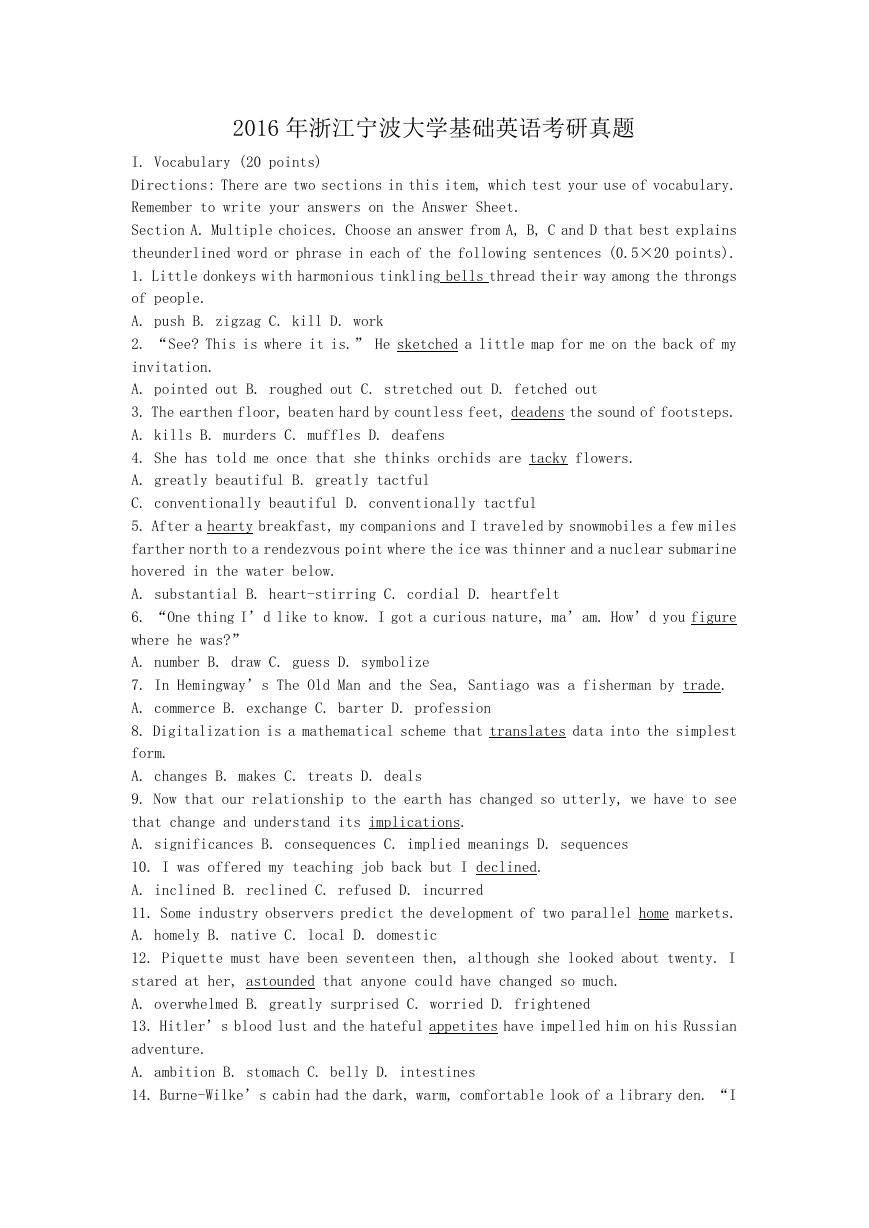


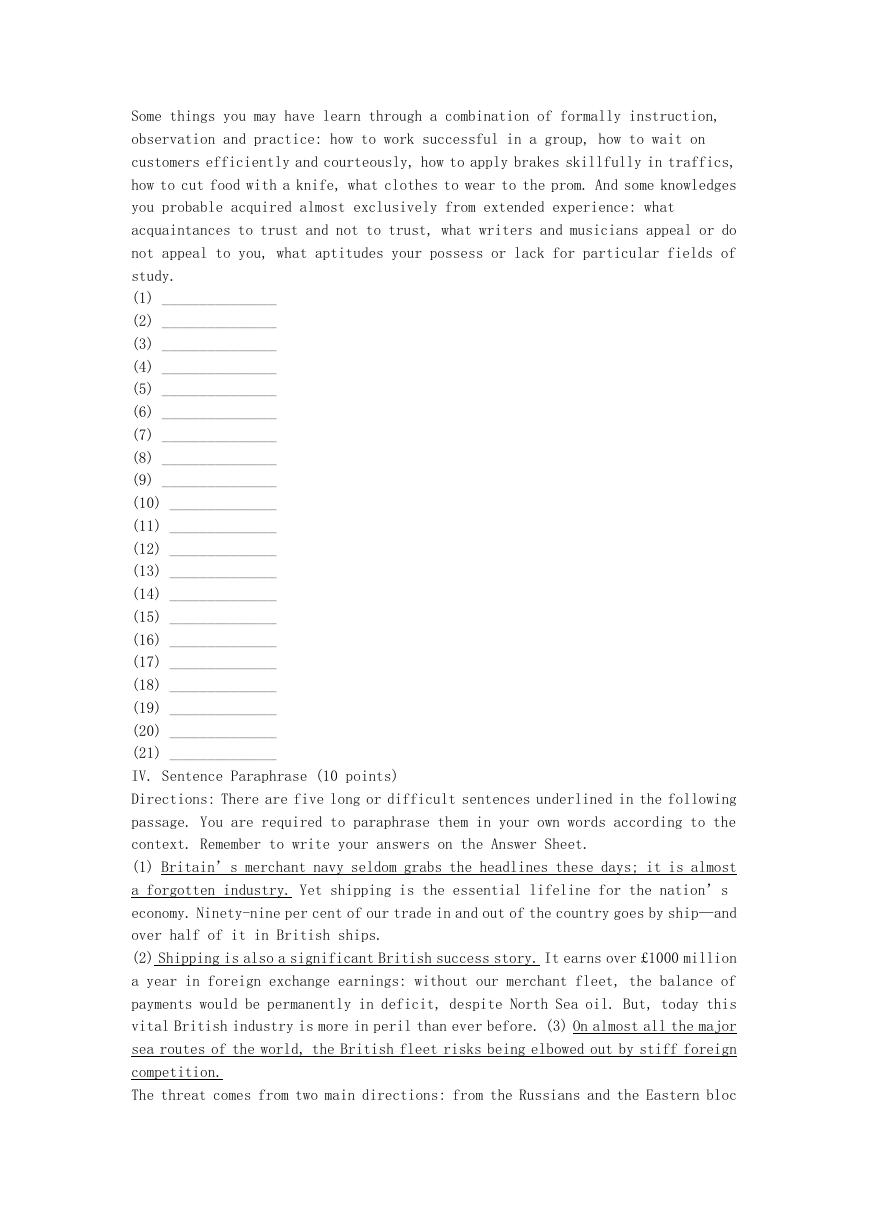
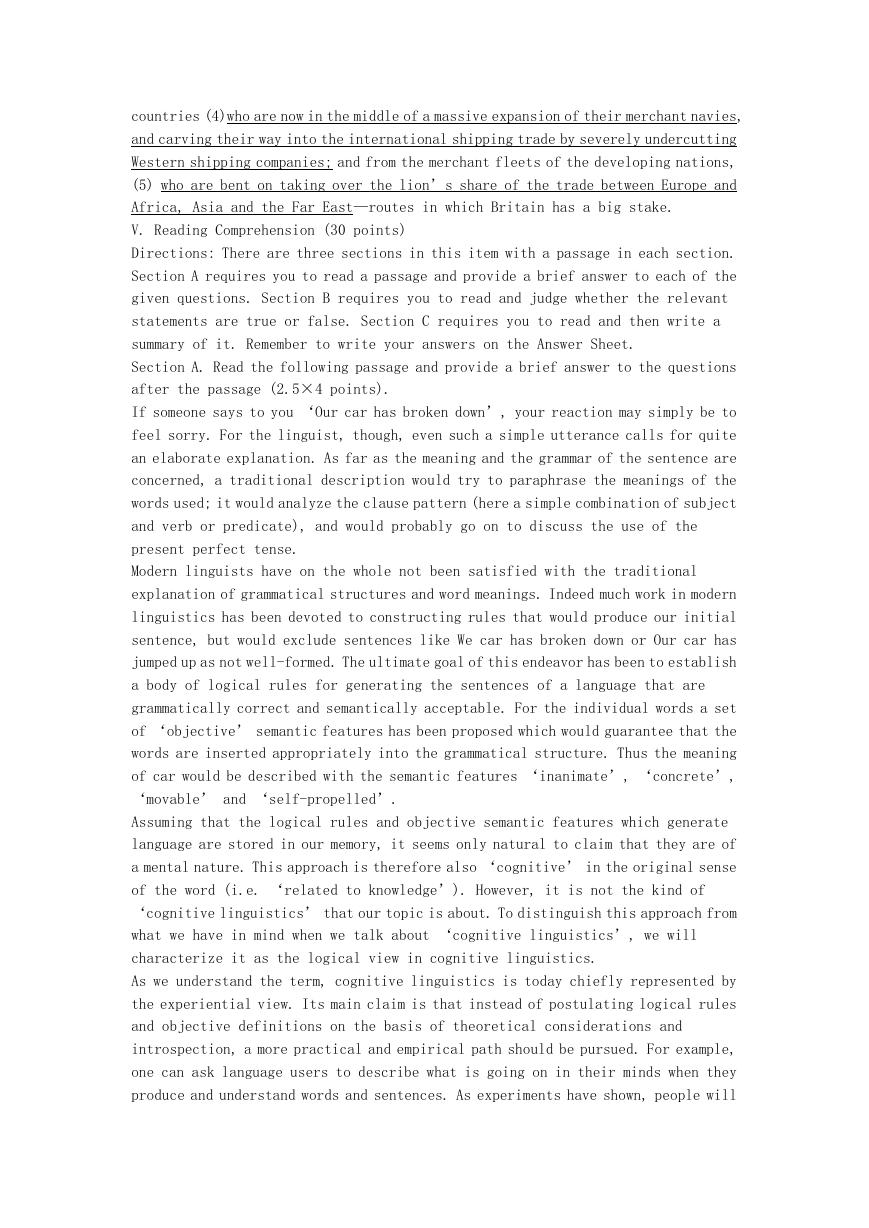
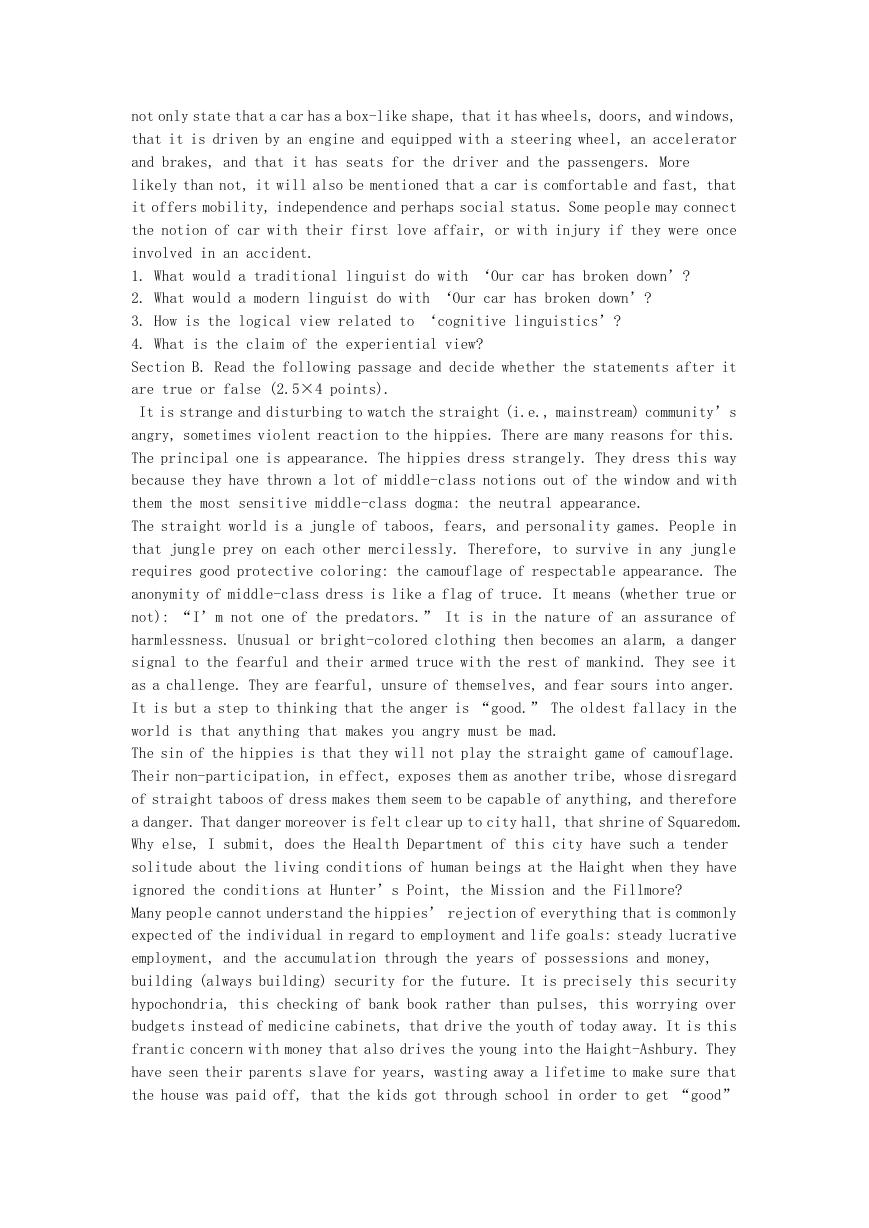
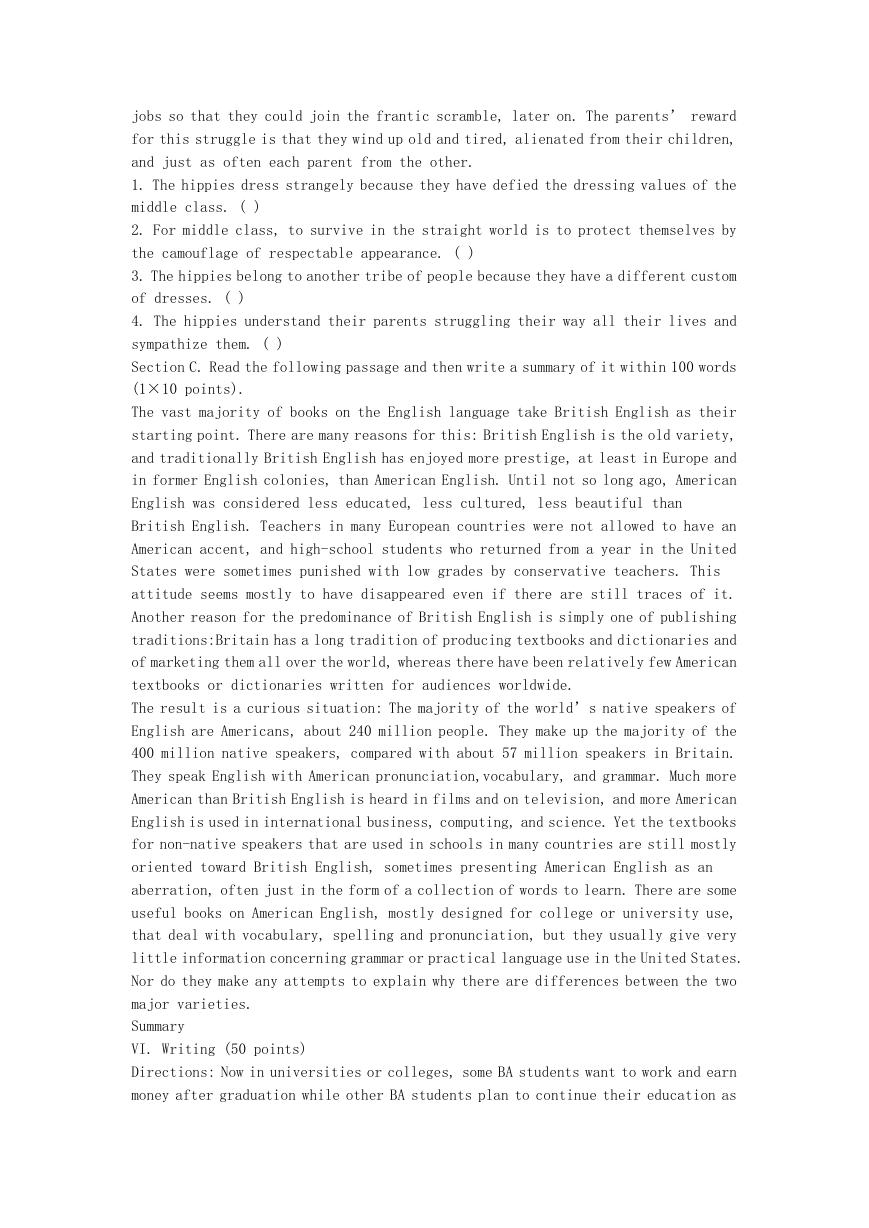









 2023年江西萍乡中考道德与法治真题及答案.doc
2023年江西萍乡中考道德与法治真题及答案.doc 2012年重庆南川中考生物真题及答案.doc
2012年重庆南川中考生物真题及答案.doc 2013年江西师范大学地理学综合及文艺理论基础考研真题.doc
2013年江西师范大学地理学综合及文艺理论基础考研真题.doc 2020年四川甘孜小升初语文真题及答案I卷.doc
2020年四川甘孜小升初语文真题及答案I卷.doc 2020年注册岩土工程师专业基础考试真题及答案.doc
2020年注册岩土工程师专业基础考试真题及答案.doc 2023-2024学年福建省厦门市九年级上学期数学月考试题及答案.doc
2023-2024学年福建省厦门市九年级上学期数学月考试题及答案.doc 2021-2022学年辽宁省沈阳市大东区九年级上学期语文期末试题及答案.doc
2021-2022学年辽宁省沈阳市大东区九年级上学期语文期末试题及答案.doc 2022-2023学年北京东城区初三第一学期物理期末试卷及答案.doc
2022-2023学年北京东城区初三第一学期物理期末试卷及答案.doc 2018上半年江西教师资格初中地理学科知识与教学能力真题及答案.doc
2018上半年江西教师资格初中地理学科知识与教学能力真题及答案.doc 2012年河北国家公务员申论考试真题及答案-省级.doc
2012年河北国家公务员申论考试真题及答案-省级.doc 2020-2021学年江苏省扬州市江都区邵樊片九年级上学期数学第一次质量检测试题及答案.doc
2020-2021学年江苏省扬州市江都区邵樊片九年级上学期数学第一次质量检测试题及答案.doc 2022下半年黑龙江教师资格证中学综合素质真题及答案.doc
2022下半年黑龙江教师资格证中学综合素质真题及答案.doc